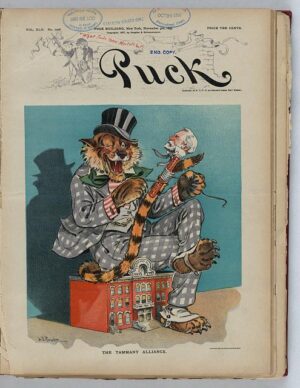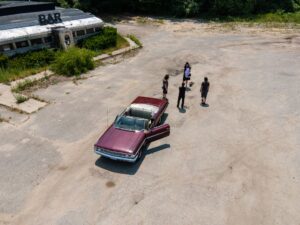Ray always believed that T-Rex possessed an instinctual sense of its impending doom. He was convinced of this whenever he viewed a picture of the prehistoric beast. In those savage and smoldering eyes, he saw flashes of despair. And the short, spindly arms—attached as they were to such a large and muscled torso—seemed to Ray a cruel trick, a tangible reminder of an incongruent existence.
Ray was thinking of dinosaurs because the clam rake in his hands, with its hollow metal basket and sloped teeth, suggested to him the outline of the T-Rex’s head. He twirled the rake’s wooden handle in his calloused palms, and made his first thrust into the murky bay. It was early January, usually much too cold a time to be standing in waist-deep water, but winter had yet to hit with full force, and Ray felt comfortable in rubber hip boots and a hooded sweatshirt. He looked about him as he worked the water, absorbing in the day’s complete grayness. The dreariness made him strangely happy, and he remembered with a smile his father’s steady proclamation that “sunshine was no friend to the fisherman.”
An elongated squeak—almost like the skin-chilling sound of fingernails scratching a blackboard—cut through the soft sound of swells lapping up against Ray’s waders. With rote response, he wormed the teeth deeper into the sand, making sure to get well under the shell, before pulling the basket toward the surface.
This was always the most exciting, and sometimes the most frightening, part of clamming: seeing what you’d dredged up from below. When Ray was still too young to wield a clam rake, but would go anyway to be with his father, an ink-black eel, its snubbed set of teeth snapping at the air, bounded out from his father’s basket and landed with a splash next to where he stood. Ray recalled the moment with shame; at the sight of the eel, he had screamed loudly—“like a girl,” his father said—and ran out of the water and to the shore and all the way back to their truck where he sat trembling.
The incident with the eel was long past, but he was now the same age his father had been when it happened. It gave him a start to think he might follow the same arc as his father. He never imagined as a child that he would one day become an adult; as an adult, he never imagined he would one day become old. But that’s exactly where he was heading.
His father had never stopped clamming, even up to a few weeks before his death; when he was so frail that a few pulls of the rake would nearly double him over with pain. Ray thought of his father again as he yanked harder on the basket. This had been their favorite place to clam: a lonely swatch of water ringed by high, grass-topped dunes. Ray felt a symbolic connection to this isolation. He was not married. Had no children. And no parents, as his mother had also passed. There were no siblings.
The basket felt unusually heavy, and Ray slid his hands lower on the handle for leverage. It was odd, he thought as he strained, that he should be so accepting of his solitude. He had not truly envisioned such a singular point to his life; he rather thought he would get married and have many children; be surrounded by loved ones. But somehow time for him had moved ahead in increments that spurned companionship.
Still, he was not entirely unhappy; he was content in many areas. And he had developed the ability to think, to think really hard—even if what he was thinking about was troublesome. He had discovered this mental aptitude after his father’s death, when he had holed up in his house for days on end and went over, moment by moment, their entire relationship. It was a process that brought him nearly to the edge of panic, but he was able to stay in the moment and achieve a full and complete memory record of their time together. This he placed in his brain as if storing a tax return in his financial file, and he had a flood of pictures and words and feelings that happened between him and his father at his ready disposal, whenever he liked.
The basket seemed to resist his pull, fighting back like a hooked fish on the end of the line. Ray figured he’d caught on a heavy rock. Or perhaps he’d dug into a bed of seaweed. He lowered his shoulder and slid his hands even lower on the rake’s shaft, until his knuckles dipped into the water. With a final jerk, he finally heaved the basket into open air. And as water and sand drained free from the basket, Ray, without blinking an eye, watched as the eel trapped inside began its leap to freedom.




